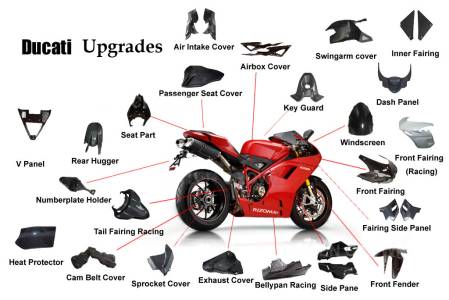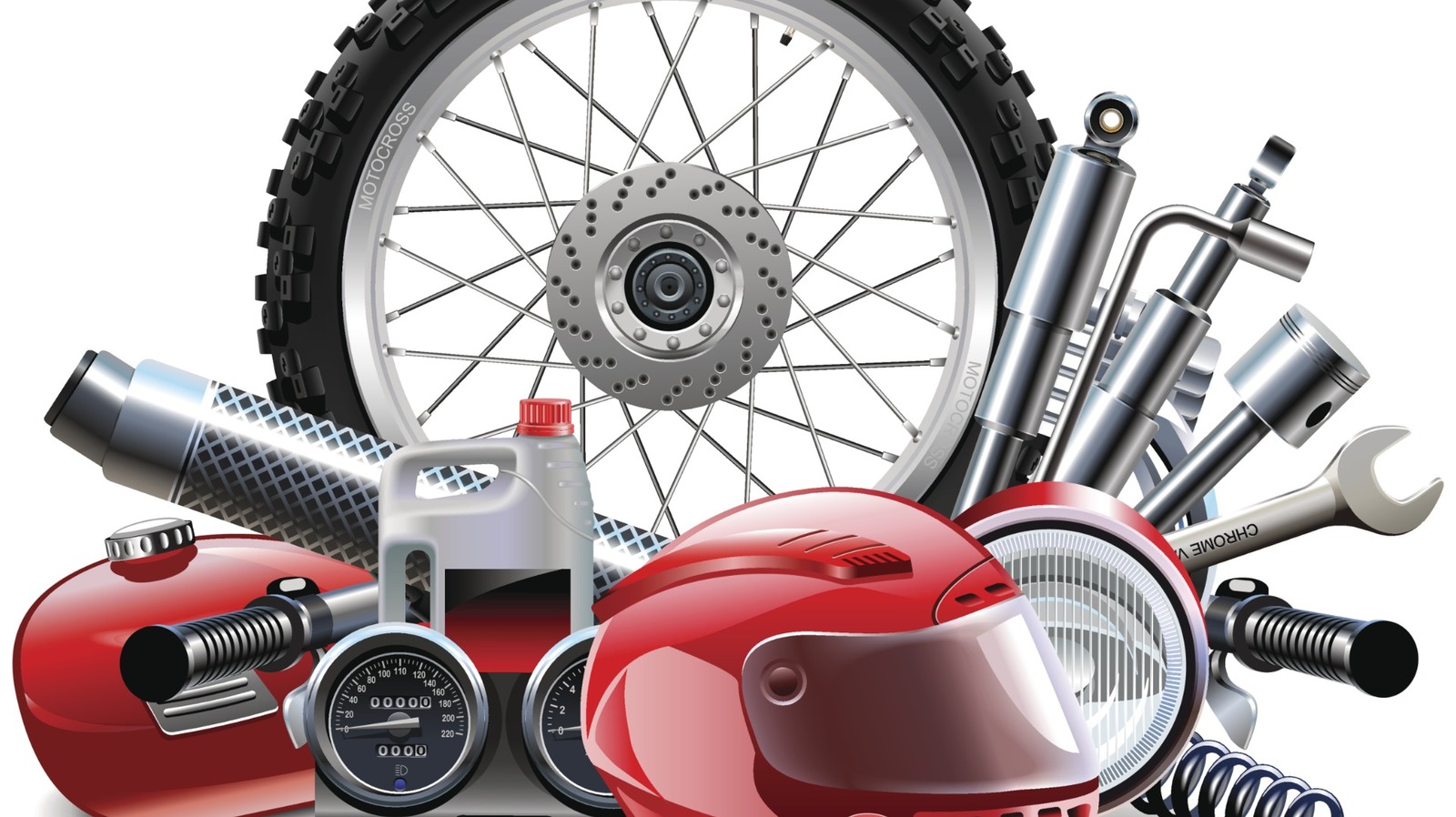What Makes High-Grade Motorcycle Parts Auckland Essential for Daily Commuters
What Makes High-Grade Motorcycle Parts Auckland Essential for Daily Commuters
Blog Article
Discover the Vital Motorcycle Parts You Required for Ideal Efficiency
Recognizing the crucial components of a bike is essential for attaining peak efficiency. Each element, from the engine to the stopping system, plays a critical function in overall performance and safety. Regular upkeep can protect against unexpected failings and boost the riding experience. Nevertheless, lots of cyclists overlook the intricacies of these systems. Discovering just how they work with each other can cause a much more efficient adventure. What important elements should every cyclist prioritize?
The Engine: The Heart of Your Motorcycle
The engine serves as the core component of a motorbike, driving its efficiency and specifying its abilities. It is accountable for converting fuel right into mechanical power, which powers the bike forward. Various kinds of engines are used, including single-cylinder, V-twin, and inline arrangements, each offering distinct characteristics matched for different riding objectives and designs. The engine dimension, commonly determined in cubic centimeters (cc), significantly influences efficiency, with larger engines usually offering more power and torque.Furthermore, the engine's style and modern technology, such as fuel shot systems or air-cooling versus liquid-cooling, affect efficiency and dependability. Maintenance is important for peak procedure; aspects like normal oil adjustments and monitoring spark plugs warranty long life. Bikers commonly think about an engine's responsiveness and level of smoothness, as these qualities enhance the general riding experience. Ultimately, the engine remains an important aspect that defines not only the motorcycle's performance but also the biker's link to the device.
The Transmission: Shifting Gears Efficiently
The transmission plays an essential duty in a motorbike's efficiency, specifically in the technicians of equipment changing. Comprehending exactly how to change gears efficiently can improve the general riding experience, while regular maintenance guarantees peak functionality. Correct focus to these elements can considerably impact the durability and efficiency of the motorbike.

Equipment Shifting Mechanics
Smooth gear shifting is essential for perfect motorbike efficiency, significantly influencing both acceleration and control. The technicians of equipment moving entail the interaction in between the clutch, equipment lever, and transmission system. When a motorcyclist engages the clutch, it disengages the engine from the transmission, permitting a gear modification without damaging the parts. A well-timed launch of the clutch, integrated with exact movement of the gear lever, facilitates a seamless change in between equipments. This process assures that the engine runs within its best power band, improving performance. Bike Parts Wellington. Furthermore, recognizing the gear proportions and their impact on speed and torque can help riders make notified choices throughout shifts, eventually adding to a much more responsive and pleasurable riding experience
Maintenance Tips Importance
Routine maintenance plays an essential role in guaranteeing that the transmission system runs effectively, permitting for smooth equipment changes. Consistently examining and altering the transmission fluid is essential, as old fluid can lead to boosted friction and wear. In addition, inspecting the clutch for wear assurances peak involvement and disengagement, stopping slippage during equipment modifications. Lubrication of moving parts is just as vital to decrease friction and enhance performance. Motorcycle owners should likewise keep an eye on for leakages and uncommon sounds, as these can show underlying issues. By adhering to these upkeep suggestions, motorcyclists can lengthen the life-span of their transmission system, ensuring that gear shifts stay seamless and adding to the general performance of their motorcycle.
The Braking System: Ensuring Safety on Every Trip
Braking systems are fundamental parts that directly influence a motorcycle's safety and efficiency. They contain different parts, consisting of brake pads, blades, calipers, and hydraulic lines, all interacting to assure effective slowdown. The kind of stopping system-- generally either disc or drum-- affects responsiveness and quiting power.Regular maintenance is vital to copyright peak performance; used brake pads can cause decreased performance and enhanced stopping distances. Furthermore, the top quality of brake fluid need to be monitored, as it can take in dampness in time, jeopardizing stopping efficiency.Riders must also think about the importance of anti-lock stopping systems (ABDOMINAL), which protect against wheel lockup during sudden quits, boosting overall security. Properly working brakes are not simply concerning stopping; they infuse confidence in the motorcyclist, permitting more secure navigating with numerous terrains. Ultimately, a dependable stopping system is essential for enjoying every trip with tranquility of mind.
The Suspension: Enhancing Convenience and Control
A well-functioning shock absorber greatly adds to a motorcycle's general performance, enhancing the efficiency of the braking system. The suspension plays a considerable duty in soaking up shocks from unequal surface areas, assuring a smoother ride while preserving tire call with the road. This get in touch with is crucial for both security and control, allowing riders to navigate corners with self-confidence and precision.Different sorts of shock absorber, such as telescopic forks or mono-shocks, offer varying degrees of comfort and handling. Correctly tuned suspension enhances responsiveness, offering the rider with an extra connected feel to the motorbike. Regular upkeep checks are vital to identify the suspension elements, consisting of springtimes and dampers, are working at their best. An effective suspension system not only raises the riding experience however likewise adds to the durability of other motorcycle components by minimizing damage. Because of this, investing in top quality suspension is important for any kind of serious motorbike lover.
The Tires: Attaching You to the Road
Tires play a crucial duty in a motorcycle's performance, acting as the primary web link in between the cyclist and the road. Understanding the various kinds of tires available can considerably affect dealing with and safety and security. Additionally, regular upkeep is crucial to assure peak tire efficiency and longevity.
Tire Enters Explained
Just how do various tire kinds affect a motorbike's performance? Tire kinds play a crucial role in establishing a motorcycle's handling, security, and grasp. Sport tires, made for high performance, deal enhanced grip and responsiveness on paved roads, making them excellent for competing and hostile riding. Alternatively, touring tires focus on sturdiness and convenience, giving a smoother trip for long-distance travel. Off-road tires, defined by their rugged step patterns, stand out in traction on unpaved surfaces, appropriate for adventure lovers. Additionally, dual-sport tires mix attributes from both on-road and off-road groups, satisfying flexible riding requirements. Eventually, choosing the right tire type is necessary for maximizing efficiency, guaranteeing security, and improving the overall riding experience.
Upkeep Tips Offered
While riding on the roadway, preserving suitable tire condition is essential for safety and security and efficiency. On a regular basis inspecting tire pressure is essential, as under-inflated tires can cause inadequate handling and boosted wear. It is advisable to evaluate tread depth frequently; used tires concession grip and stability. Furthermore, motorcyclists should seek indications of damages, such as fractures or bulges, which can show the need for substitute. Rotating tires regularly ensures also put on, improving longevity. Moreover, maintaining tires clean from particles and staying clear of too much curbs can extend their life expectancy. Keeping proper placement and equilibrium adds to peak performance, decreasing stress and anxiety on various other bike parts. Adhering to these maintenance tips will substantially boost the overall riding experience.
The Fuel System: Fueling Performance and Performance
The gas system plays an important role in making the most of a motorcycle's efficiency and efficiency, as it guarantees the ideal shipment of gas to the engine. It comprises a number of vital parts, consisting of the gas tank, gas pump, gas filter, and gas injectors or carburetor. Each component has to function successfully to ensure a powerful and smooth ride.The fuel container shops gasoline and have a peek at this website supplies it to the engine via the gas pump, which creates the necessary stress. A fuel filter prevents pollutants from entering the engine, while the injectors or carburetor mix fuel with air for combustion.Proper maintenance of the gas system is vital; a clogged up filter or malfunctioning injector can bring about decreased efficiency and raised fuel usage. By validating that the gas system operates successfully, bikers can delight in improved throttle action, better gas economic situation, and overall boosted riding experience.
The Electric System: Powering Your Trip
A reliable electric system is essential for the general performance image source and safety of a motorcycle, as it powers crucial components such as the ignition, lights, and various digital systems. This system consists of the battery, which stores power, and the generator, in charge of generating power while the engine runs. The wiring harness connects these elements, making sure reliable power distribution.Additionally, fuses shield the system from overloads, while relays help regulate high-current tools with low-power signals. A properly maintained electrical system enhances performance by guaranteeing smooth starts and constant operation of signals and lights, important for motorcyclist visibility and safety.Regular checks of the battery's charge and connections are essential for protecting against electric failings. Bikers need to likewise evaluate wiring for damage, guaranteeing all parts function ideally. Inevitably, a durable electric system adds substantially to the total performance and reliability of the motorcycle.
Often Asked Questions
How Commonly Should I Change My Motorcycle's Battery?
The frequency of motorcycle battery substitute depends upon usage and upkeep (Motorbike Components NZ). Usually, batteries need to be replaced every 3 to 5 years. Routine checks can aid identify when a replacement is required for peak efficiency
What Tools Do I Need for Standard Motorcycle Maintenance?
For standard motorcycle upkeep, one calls for vital tools such as an outlet collection, wrenches, screwdrivers, pliers, tire pressure gauge, and a torque wrench. These devices assist in efficient maintenance and assure the bike runs successfully and securely.
How Can I Improve My Motorcycle's The rules of aerodynamics?
To improve motorbike the rules of aerodynamics, one ought to take into consideration adjusting fairings, using windscreen expansions, maximizing body setting, and minimizing overall weight. These adjustments help lessen drag, boosting stability and gas effectiveness during trips.
What Are the Indicators of a Failing Electrical System?
Indicators of a falling short electric system include lowering lights, trouble starting, irregular instrument analyses, and blown merges. Bike Parts Wellington. Uncommon scents or rust important link around battery terminals may also show underlying issues requiring prompt interest for safety and performance

How Do I Select the Right Oil for My Motorbike?
When choosing oil for a motorbike, one must take into consideration the supplier's specifications, viscosity scores, and the sort of riding. In addition, artificial versus standard oil can influence efficiency and engine defense, influencing the choice substantially. The engine dimension, normally measured in cubic centimeters (cc), substantially influences performance, with larger engines normally giving more power and torque.Furthermore, the engine's design and modern technology, such as gas shot systems or air-cooling versus liquid-cooling, influence performance and dependability. A well-functioning suspension system greatly adds to a motorbike's total efficiency, matching the effectiveness of the stopping system. The gas system plays an essential duty in making the most of a motorcycle's efficiency and performance, as it assures the ideal distribution of gas to the engine. A gas filter stops pollutants from going into the engine, while the injectors or carburetor mix gas with air for combustion.Proper maintenance of the fuel system is essential; a blocked filter or malfunctioning injector can lead to reduced performance and increased fuel consumption. A properly maintained electrical system enhances efficiency by making sure smooth begins and regular procedure of lights and signals, important for motorcyclist exposure and safety.Regular checks of the battery's cost and links are essential for avoiding electrical failings.
Report this page